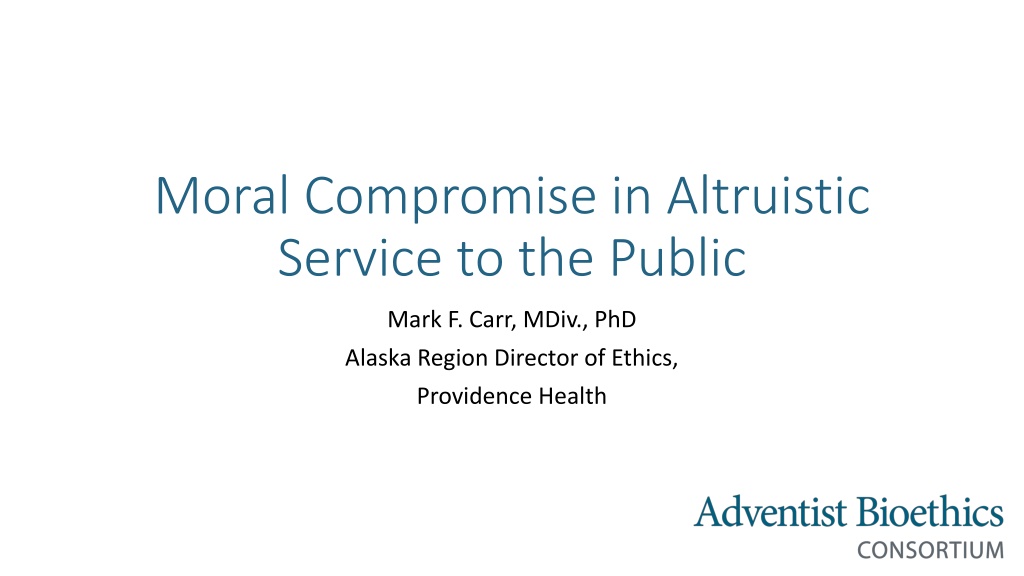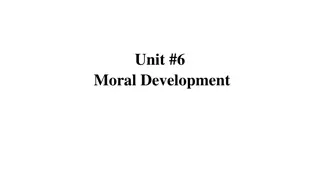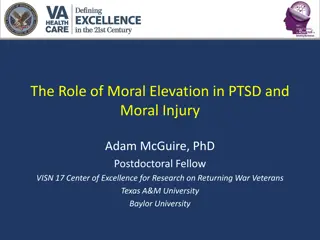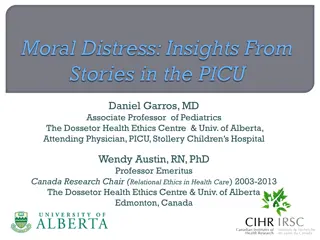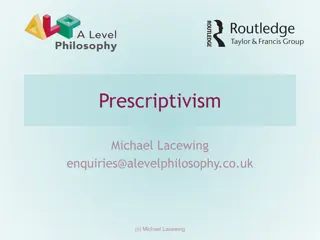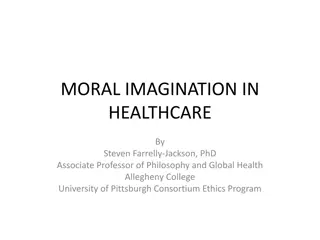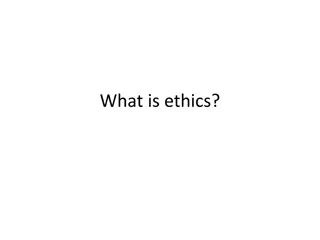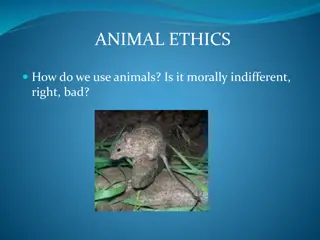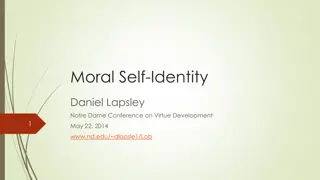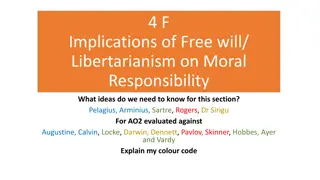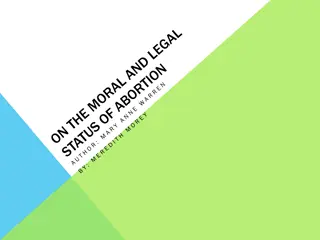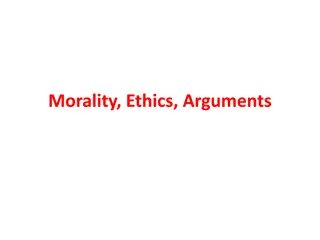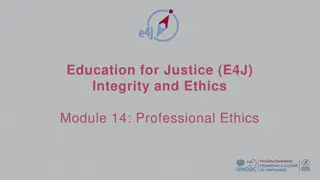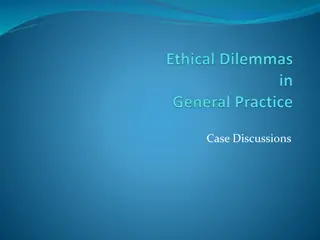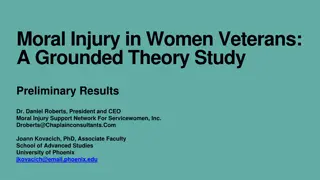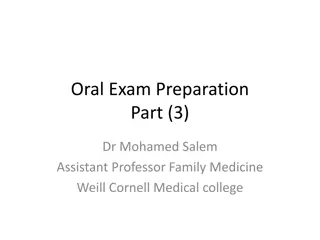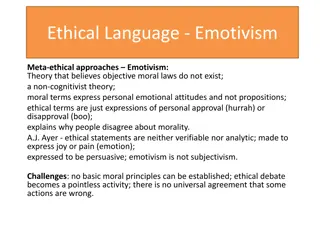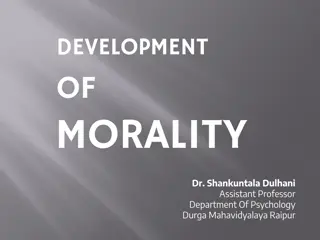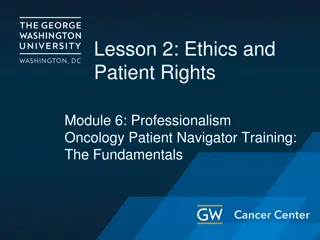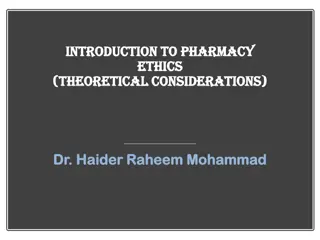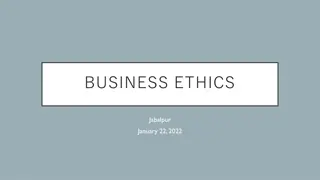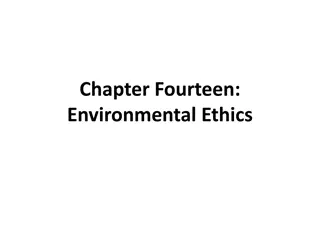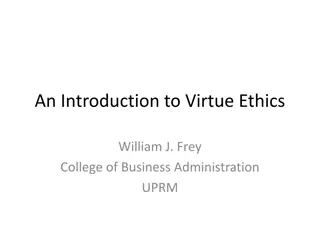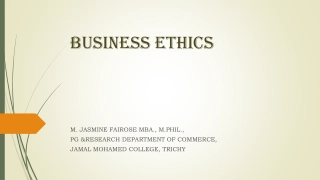Moral Compromise in Altruistic Service: Navigating Healthcare Ethics
Altruism in healthcare raises dilemmas of moral compromise, as faith-based providers balance societal norms with personal convictions. The call to be altruistic like Christ conflicts with legal and medical standards, prompting reflection on conscience and professional obligations.
Uploaded on Sep 06, 2024 | 0 Views
Download Presentation

Please find below an Image/Link to download the presentation.
The content on the website is provided AS IS for your information and personal use only. It may not be sold, licensed, or shared on other websites without obtaining consent from the author. Download presentation by click this link. If you encounter any issues during the download, it is possible that the publisher has removed the file from their server.
E N D
Presentation Transcript
Moral Compromise in Altruistic Service to the Public Mark F. Carr, MDiv., PhD Alaska Region Director of Ethics, Providence Health
A few problems In the early days of Adventist healthcare: -It was the entering wedge, a complex blend of altruism for others, adding to Church membership, and preparing for the second coming. -One of the biggest issues we fought about, in those days, was what to feed our patients. My oh my, how times have changed: -How many of our healthcare executives and caregivers know anything about the entering wedge? -Convincing patients to join the Church and prepare for the second coming is an afterthought. Modern American healthcare is primarily a business, explicitly designed to extract money from sick people: -Now, we treat customers rather than patients. -Under federal and state licensing and accreditation, our customers have rights and expectations. -Faith-based healthcare such as ours is different but it remains a business; an eleemosynary business. The American public has evolved, morally, in ways that are often at odds with Adventism s prevailing ethos: -Abortion remains legally available and should be offered in hospitals that serve the American public. -Gender identity and transition therapies/procedures are clinically standardized and should be available. -Assistance in dying is legal in several states and customers expect it to be available in our hospitals.
Christs Healing Ministry and the call to Altruism If it is true that Christ sacrificed himself for others, And if it is true that Christ s disciples ought to model themselves after him, Then it seems true that we ought to be altruistic in our efforts to extend Christ s healing ministry. Definition of Altruism: Placing the needs of the other over your own needs. Thus, in a ministry to the public, the needs of the public should supersede our own. Healthcare is not an inward-facing ministry in which we invite others to join us in our sanctuaries. This is our service, our outward-facing ministry to others for others, no strings attached. This places us (faith-based healthcare ministry in America) in a moral quandary. We should offer legally allowable, medically standardized therapies to our customers. But we don t, because of our needs. To protect our needs, should we invoke our conscience, our religious liberty, or both as a means of navigating this difficulty?
Using conscience to avoid altruism Within the ethics literature on Conscientious Objection within healthcare we find three positions. These apply to us individually: -Conscience Absolutism: Nothing can impose upon your personal, moral convictions and force you to engage in an act which you consider morally illicit, regardless of what the public does or doesn t belive. SO: Get out of the business or prepare for the onslaught of those who disagree with you. -Compromise Approach: Healthcare professionals are at least obligated to balance their interest in moral integrity with patients health needs and interests. SO: Stay in the business and manage self and conflicts with the public in a manner that insists upon compromise. -Incompatibility Thesis: There is no room for your personal, moral convictions when they conflict with the practice standards of your profession and the public you serve. SO: Stay in the business and adopt professional and societal standards. Source: Wicclair, Mark. Conscientious Objection in Healthcare: An Ethical Analysis. Cambridge, 2011. p. 60
Using conscience to avoid altruism Conscience on a corporate level. Do these three positions legitimately apply to us on a denominational/corporate level? -What, exactly, is conscience on a corporate level? -Does the Church, as a whole, have a conscience? -If yes, who gets determine the contents? What lies inside the acceptable limits? -Therapeutic Abortion, Palliative Sedation, Gender Transition -If the Church does not decide the confines of our Adventist Conscience, how can healthcare that purports to be Adventist invoke our conscience to avoid offering services to the public? NEJM: Hospital Mergers and Conscience-Based Objections Growing Threats to Access and Quality of Care, Ian D. Wolfe and Thaddeus Pope Institutional conscience-based objection differs materially from the more familiar concept of individual conscience-based objection .Limits on the services available at hospitals that function within the confines of religious doctrine pose substantial risks for patient choice, patent safety, and the fundamental principle of autonomy. p. 1388.
Using religious liberty to avoid altruism. In December 2019, the NAD published a statement in response to The Fairness for All Act entitled, With Religious Freedom Under Threat, Is There a Way Forward? as the fabric of society shifts, so inevitably do its political and legal realms. Among other things the NAD supports The Fairness for All Actbecause it protects both religious institutions and people of faith from being forced to violate their conscience in the areas of sexual orientation and gender identity .Healthcare providers will not be required to provide and/or perform medical procedures that violate their beliefs.
The emerging difficulties in American faith- based healthcare Over two years ago, Adventist Health West and St. Joseph Health struck a joint operations agreement in the Northern California market. They called it Sacred Trust. The CA Attorney General s office denied their application in October of 2019. Why? The Attorney General concluded that the proposed transaction is not in the public interest .[T]he AG had received comments from various consumer and patient rights groups expressing concern that the merger of the religiously-affiliated health systems would further restrict access to certain types of health services, such as reproductive services, gender transition services, and end of life care, especially given that many of the health facilities are located in rural areas where alternative health care options are scarce. The National Law Review, Adventist-St. Joseph Merger: AG Concludes Merger is not in the Public Interest. 2/2/2020
Managing our Compromise position Two recommendations: 1. Church theologians should work with the General Conference and Adventist Healthcare Corporations to identify how we can (or cannot) have a corporate conscience. What are its confines? 2. Create structures to delineate our compromise position. What are its acceptable ethical parameters? For Example: Within Catholic Moral Theology, principles of cooperation with evil determine licit or illicit Formal or Material cooperation. A recent analysis I was involved in determined that the arrangement between a hospital and a physician group was licit, remote, mediate, material cooperation with evil. And one good idea: Create an Adventist Healthcare Association that expands beyond public policy to bring more unity among our five Systems. The sooner we learn to play together, the more likely we are to successfully continue the teaching and healing ministry of our Lord.
